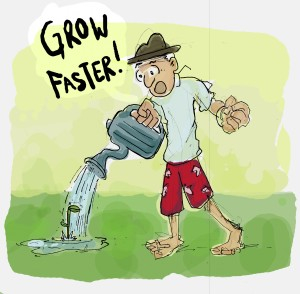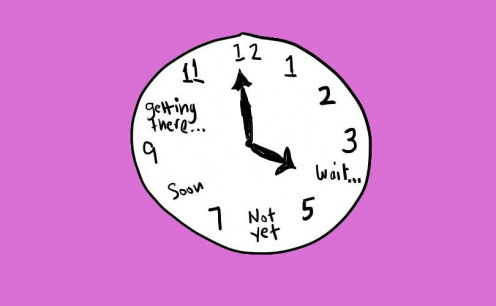The benefits of patience: winning the never ending battle to become more tolerant



""Adopt the pace of nature; her secret is patience." Ralph Waldo Emerson (1803-1882), American essayist and champion of individualism, gave us wise advice for addressing our needs in very stressful societies and situations. Emerson showed wisdom in his critique of the frenetic pace of modern society. He, who lived during the age of Industrialization, already felt the pace of modern life hastening. It is unsurprising to find that we, who live in this digital era,find that life's pace has escalated to an absolutely frantic rate.
Indeed, the pace of life has become much quicker than before. with the development of social media, everything has to be attended to at the touch of the keys. With the increased use of tablets and mobile devices, it is even FASTER. I find myself waking and feeling neglectful if I have not answered Facebook messages or comments that were sent just two or three hours before. I feel the same way if I do not respond to the kind comments on my article instantly. Everything calls for an instant response!
Patience in these times has become a lost virtue. Though life is changing and it behooves us to change along with it, some things will remain the same. One of them is that all good things come to those who wait.

To begin with, I am not a very patient person by nature.I cannot claim that I now am either. Always on the go, I get things done quickly enough and waiting is somewhat a difficulty. If I have to wait, I am wont to read into the matter quickly and think that something is out of place. I tend to grumble if I have to wait for too long!
Teaching taught me to develop great patience with people. I was a teacher to several seven-year-old students who suffered (and still do) severe hearing loss. It took much forbearance to cope with planning engaging lessons and thinking of strategies to break concepts down so that they would understand them. To top it off, these pupils were not exactly angels. Like other children, they were susceptible to fits of naughtiness.
I move on to teaching teenagers, which was another ball game of patience. Youth can be a tough challenge to face, what with the advent of raging hormones and back talk.Facing insult for no apparent reason was a challenge, for facing rebellious youth and resisting the urge to counter their unreasonableness was TOUGH. Counseling recalcitrant students, many of whom sadly chose to tread on the wrong path was another battle. All these took many sessions of downtime, calming and prayer.


The benefits of patience
Some may developing personal qualities like patience pale in importance to honing academic and other skills. I would have to beg to differ, because such are the qualities that make the difference to the quality of life. How?
Patience is necessary for success.
The old adage "good things come to those who wait" could not be more true. Many of us as writers would empathize with this notion. Ask any of us about getting a book published . Nearly all would say that it takes time and waiting!
It takes lots of waiting to be a great author. In fact, it takes lots of waiting to be successful at anything! Colonel Saunders of Kentucky Fried Chicken fame understood this well. he lived out of his car and had his fried chicken recipe rejected 1009 times before it found reception! The wait was well worth it because the fast food brand has become more than a household name today. A clear example of patience being a recipe for success!
Having patience is a way to develop self confidence.
If Colonel Saunders did not believe in his own recipe, he would not have withstood all that rejection and His famous brand of Southern Fried Chicken would not have come into being. He must have had phenomenal self confidence to bring KFC to fruition!
Having patience is indeed a way to develop this quality. The more people tell us "no", the more we should have confidence and believe in ourselves It may just be that things just need a little fine tuning!
Patience transforms suffering into joy.
If we take the time to let it, patience can transform suffering into joy. Teaching is an example of a profession where this can work well. Students with Oppositional Defiant Disorder can take the Mickey out of any teacher. When these students applaud a teacher for his patience, the long tenure of tolerance he has to go through is worth it.
ihad a student who punched walls in class and walked about non-stop. The same student chose to defy me as a figure of authority and made life very difficult in the classroom. I must say that it was nerve-wracking suffering his insults for an entire year.
When the same boy unexpectedly turned up with a rose for Teachers' Day and offered hid profuse thank you for everything he had put me through, I knew I had won the battle and the patience I had shown this child (by no means was it easy at all) was worth it. His affirmation was the joy I had been waiting for the entire year as a teacher.
Being patient brings peace of mind.
There is no better time for trying to attain a sense of calm than while waiting.It is not as easy to do so while we are busy and we get caught up in routine. If we have to wait, why not try prayer? The sense of calm one feels after can be priceless.

14 steps for developing patience
15 ways to be more patient
1. Look at the bigger picture.
There may be greater benefits to our situation if we wait. Colonel Saunders would not have seen the phenomenal success KFC is today if he had given up promoting his recipe in the midst of rejection!
2. Make use of negative situations.
If we face negative situations, make use of them. Taking writing as an example, while waiting for that first writing paycheck, use the time to hone writing skills! As the craft gets better, so do the playoffs.
3. Rationalize and think about the impact your impatience will have on others.
Sometimes, taking time out to discover the logic of situations can be of great help. Say that a person is prone to snapping at others. If the person is sincere about wanting to be more patient, he or she can take time to remember that the next time they snap at someone, they may well find themselves alone. No one wants to be around an alligator!
One impatient and angry outburst can leave a mark that is difficult to erase. An incident with my father clearly stands out in my mind to this day.
I was using a computer keyboard while my father was sleeping and my father, a light sleeper, got so "keyed up" and impatient over tit that he drove me out of the house! Naturally, he was apologetic over the matter. As you can see, while I have long forgiven the outburst, it still left its mark. Impatience has the potential for ruining relationships.
4. Be reflective.
Think about all the times impatience has cost in terms of relationships and success in all forms. That is always a great reminder not to move too fast!
I cannot count the times students have become frustrated with me as I tried to plough through the syllabus quickly, it a fit of wanting to get it over with before term closed. They struggled with understanding. It would have been better if I had slowed the syllabus down a little to help them to get a better grasp of things.
5. Keep notes.
If you find yourself being impatient with your child and want to better that relationship, try taking note of each time you have scolded him for the little things he may have unintentionally done, or for the times he failed a test although he tried. take notes and give yourself time to form a different take on the situation.
6. Figure out your triggers!
Understanding what makes a person impatient helps a person to avoid the buttons others may push that will set him off. Disengagement with a potentially explosive situation will be helpful in diffusing it.
A classroom situation can be a perfect example of this. Kids know which of the teachers buttons to push to either set them off or to win their sympathy. Mine knew that I would be angry when they criticized my lack of height. I laughed along with them and this foiled their plans because they did not expect that reaction!


7. Take deep breaths.
Taking deep breaths before continuing to face any situation where one's patience may be tried and tested but it always helps one to calm down. it helps a person to put things in perspective as well.
I have had to do this many times in class when facing defiant pupils who refuse to back down. it helped me to quickly put things in perspective and decide which was the best way to handle the situation.
8. Take baby steps.
Rome was not built in a day, and everything will have to run its course. If you find yourself becoming impatient, let it go and try to do better next time. Going on guilt trips about your lack of patience will not help to better the situation!
9. Take time out.
During times when our patience is tested, it is good to take time out to be alone to let the impatience dissipate. When I am irritated with my husband, I usually take my IPAD and go off alone to be by myself for a while. The frustration is soon forgotten!
10. Don't sweat the small stuff.
It can be a waste of time fretting over minor matters, like the dog barking at the wrong time or your child suddenly crying. Just address the matter and it soon blows over!
11. Visualize.
Thinking about and picturing a calm situation will make your own demeanor more composed.I always took time to visualize a calm classroom before I walked into it. No matter how students reacted, when they saw a calm me, they would compose themselves too.


12. Look inwards, not outwards.
The next time annoyance hits, ask if you have a personal motivation for being impatient. There are many times when a person becomes angry because he or she has his own rationalizations and prejudiced notions.
I used to be really impatient with my in-laws for doing things slowly when I first got married. soon realized that the impatience was my own discomfort at suddenly having a new set of elders who embraced a totally different style of living. my husband and I gave ourselves time to adjust and that worked.
13. Find healthy ways to relieve frustration.
I usually have a book to read or dabble on my IPAD while waiting to complete long, frustrating, crowded train journeys. The stations pass very quickly!
14. Have a good laugh!
Find something to amuse you while you wait at the doctor's.Look for good jokes on the Internet! The good chortle labor tens the dreary wait!
15 . Expect the unexpected.
We can have grand plans, but these will not always go our way. Re-route instead of wasting time being annoyed and impatient.

Conclusion
Patience is a lifelong effort and like all other skills, it requires practice. if you find yourself failing, do not waver, because no one is perfect. in the words of the great Swiss psychologist Carl Jung:
"Even a happy life cannot be without a measure of darkness, and the word happy would lose its meaning if it were not balanced by sadness. It is far better take things as they come along with patience and equanimity. "
Hubs on relationships by Michelle Liew
- Managing conflict in relationships: a delicate yet necessary endeavor
Conflict management is a most delicate yet necessary task. Some stratgies and things to consider to make the process easier. - How to assert ourselves without burning relationship bridges: Reasons why people find it difficult t
Saying "No" to others can be a really difficult thing to do. Here are some tips and phrases for saying "No" without saying No and burning the bridges! - How to start and maintain an engaging conversation: common errors in conversations
An article about making conversations and the common mistakes we make while being in conversation - Communication in marriage and relationships: My story of how two opposites can attract
With communication, two opposites can come together in a marriage. Here are some tips for good communication in relationships!









